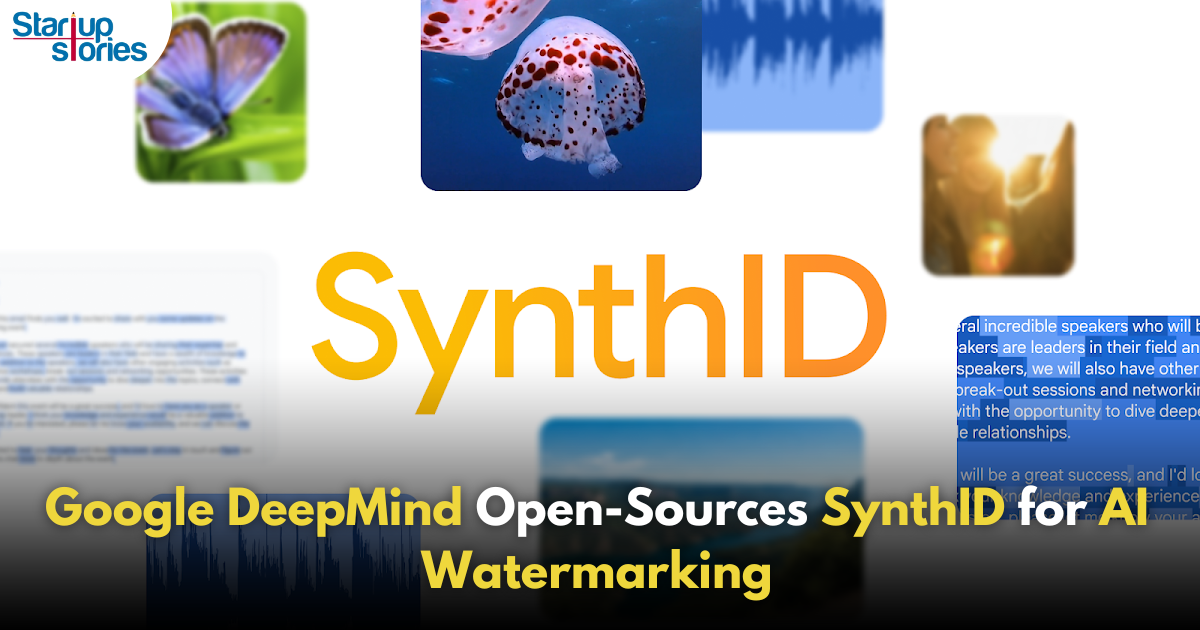Latest News
Google DeepMind SynthID AI Watermarking Technology Open-Sourced to Businesses and Developers!

Google DeepMind has open-sourced a new technology to watermark AI-generated content, named SynthID. This artificial intelligence (AI) watermarking tool can be used across different modalities, including text, images, videos, and audio. However, at this stage, it is primarily offering the text watermarking tool to businesses and developers. The goal of this initiative is to facilitate the detection of AI-generated content and promote responsible use within the AI community.
Overview of SynthID
The SynthID watermarking technology aims to ensure that AI-generated content can be easily identified. By making this tool accessible through the updated Responsible Generative AI Toolkit, Google DeepMind seeks to encourage wider adoption among creators and developers.
Features of SynthID
- Text Watermarking: Currently available for text, allowing creators to embed watermarks that indicate whether content was generated by AI.
- Cross-Modal Capabilities: Although text is the initial focus, SynthID is designed to extend its capabilities to images, audio, and video in the future.
- Open-Source Availability: Developers can access SynthID via Google’s Hugging Face listing, promoting integration into various applications.
The Importance of Watermarking
AI-generated text has proliferated across the internet, raising concerns about misinformation and content authenticity. A study by Amazon Web Services AI lab indicated that as much as 57.1% of all sentences online translated into two or more languages might be generated using AI tools. While this can lead to harmless content creation, it also opens doors for misuse by bad actors who may generate misleading information or propaganda.
Challenges in Detection
Detecting AI-generated text has proven challenging due to the nature of how these models operate. Traditional watermarking methods may not be effective since bad actors can easily rephrase or modify content. However, Google DeepMind’s SynthID employs a novel approach:
- Predictive Watermarking: The tool uses machine learning algorithms to predict subsequent words in a sentence and subtly alter them with synonyms from its database. This creates a unique watermark pattern that can later be analyzed for authenticity.
Watermarking Techniques for Different Media
For various media types, SynthID employs specific techniques:
- Images and Videos: Watermarks are embedded directly into the pixels of images or frames of videos, making them imperceptible to the human eye but detectable through specialized tools.
- Audio: Audio files are converted into spectrographs before embedding watermarks, ensuring they remain inaudible while still being detectable.
These methods aim to maintain the quality of the original content while providing a reliable means of identification.
Future Developments and Community Engagement
Google DeepMind plans to continue evolving SynthID as part of its commitment to responsible AI usage. By open-sourcing this technology, the company hopes to gather feedback from developers and stakeholders, enhancing the tool’s effectiveness over time.
Limitations and Considerations
While SynthID represents a significant advancement in watermarking technology, it is not without limitations:
- The effectiveness of watermark detection decreases if AI-generated text undergoes significant rewriting or translation.
- The technology is not designed as a comprehensive solution but rather as one part of a broader strategy to combat misinformation.
Conclusion
The launch of SynthID marks an important step toward enhancing transparency and accountability in AI-generated content. By making this technology accessible to developers and businesses, Google DeepMind aims to foster responsible practices within the rapidly evolving landscape of artificial intelligence.
As organizations increasingly rely on AI tools for content creation, initiatives like SynthID will play a critical role in ensuring the integrity of information shared online. The ongoing development and community involvement in refining this technology will be essential in addressing challenges related to misinformation and content authenticity in the digital age.
Latest News
Peak XV New Funds: $1.3B Commitment for India Startup Surge 2026

Peak XV Partners has launched three new funds totaling $1.3 billion, targeting India’s booming startup ecosystem. The lineup features the $600M Surge fund (8th edition) for early-stage ventures, a $300M Growth Fund for Series B+ scaling, and a $400M Acceleration Fund for rapid portfolio expansion. This commitment arrives as India’s VC inflows rebound, with AI and fintech leading 2026 trends.
These funds build on Peak XV’s legacy of backing unicorns like Zomato and Pine Labs, offering founders capital plus strategic guidance amid post-winter recovery. Early-stage deals surged 20% last year per Tracxn, positioning Peak XV to fuel the next wave of innovation in SaaS, climate tech, and consumer plays.
For startups eyeing Peak XV new funds or Surge fund 2026 applications, this signals prime opportunities. Investors and marketers should watch for deployment updates India remains a global VC hotspot.
Latest News
D2C Brand Neeman’s Raises $4 Million for Tier 2/3 Store Expansion & Eco-Friendly Shoes

Hyderabad, January 13, 2026 Neeman’s, India’s leading D2C footwear brand famed for sustainable shoes and patented PIXLL® technology, has raised $4 million from existing investors. This funding boosts its cumulative capital past $10 million since 2015, with a post-money valuation nearing $50 million. CEO Vijay Chahoria emphasized offline retail as the “next frontier,” planning 50+ new stores in Tier 2/3 cities like Jaipur and Lucknow to blend eco-friendly innovation with hands-on customer experiences.
In India’s booming D2C ecosystem where footwear sales hit ₹1.2 lakh crore in 2025 Neeman’s targets hybrid retail amid high online CAC and 25-30% returns. Backed by vegan, machine-washable shoes priced ₹2,000-4,000, the brand leverages PIXLL® (5x more breathable than leather) for carbon-neutral comfort. Recent 5x revenue growth to ₹100 crore ARR, 1M+ pairs sold via Myntra and stores, and awards at India D2C Summit 2025 position it ahead of rivals like Paaduks.
Neeman’s offline expansion India eyes the $15B sustainable footwear market by 2028, fueled by PLI schemes, Gen Z’s 70% eco-preference (Nielsen), and Southeast Asia exports. Challenges like real estate costs are offset by data-driven inventory and omnichannel QR tech. Watch for Q1 2026 launches in Hyderabad and Bengaluru redefining D2C success through authentic, “Wear the Change” branding.
Latest News
Centre Mulls Revoking X’s Safe Harbour Over Grok Misuse

The Centre is weighing the option of revoking X’s safe harbour status in India after its AI chatbot Grok was allegedly misused to generate and circulate obscene and sexually explicit content, including material seemingly involving minors. The IT Ministry has already issued a notice to X, directing the platform to remove unlawful content, fix Grok’s safeguards, act against violators, and submit a detailed compliance report within a tight deadline. If the government finds X’s response inadequate, it could argue that the platform has failed to meet due‑diligence standards under Indian law, opening the door to harsher action.
Under Section 79 of the IT Act, safe harbour protects intermediaries like X from being held directly liable for user‑generated content, provided they follow due‑diligence rules and promptly act on legal takedown orders. Revoking this protection would mean X and its officers could be exposed to criminal and civil liability for obscene, unlawful, or harmful content that remains on the platform, including AI‑generated images from Grok. This prospect significantly raises X’s compliance risk in India and could force tighter moderation, stricter AI controls, and more aggressive removal of flagged posts.
The Grok episode also spotlights the regulatory grey zone around generative AI, where tools can create harmful content at scale even without traditional user uploads. Policymakers are increasingly questioning whether AI outputs should still enjoy the same intermediary protections as conventional user posts, especially when they involve women and children. How the government ultimately proceeds against X over Grok misuse could set a precedent for AI accountability, platform responsibility, and safe harbour interpretation in India’s fast‑evolving digital ecosystem.













Cohjkqms
May 23, 2025 at 4:35 pm
Explore the ranked best online casinos of 2025. Compare bonuses, game selections, and trustworthiness of top platforms for secure and rewarding gameplaycasino slot machine.
criar conta na binance
June 27, 2025 at 6:04 am
Thank you for your sharing. I am worried that I lack creative ideas. It is your article that makes me full of hope. Thank you. But, I have a question, can you help me?
GO88
November 6, 2025 at 4:12 am
Tham gia cộng đồng game thủ tại Go88 để trải nghiệm các trò chơi bài, poker phổ biến nhất hiện nay.
MM88
November 7, 2025 at 12:21 pm
Khám phá thế giới giải trí trực tuyến đỉnh cao tại MM88, nơi mang đến những trải nghiệm cá cược thể thao và casino sống động.
站群程序
November 8, 2025 at 9:54 am
采用高效谷歌站群策略,快速提升网站在搜索引擎中的可见性与权重。谷歌站群
Kuwin
November 11, 2025 at 5:23 pm
kuwin sở hữu kho game đa dạng từ slot đến trò chơi bài đổi thưởng, mang đến cho bạn những giây phút giải trí tuyệt vời.
谷歌站群
November 14, 2025 at 9:09 am
专业构建与管理谷歌站群网络,助力品牌实现全域流量的强势增长。谷歌站群
MM88
November 15, 2025 at 3:07 pm
Với giao diện mượt mà và ưu đãi hấp dẫn, MM88 là lựa chọn lý tưởng cho các tín đồ giải trí trực tuyến.
iwin
November 20, 2025 at 7:49 pm
iwin – nền tảng game bài đổi thưởng uy tín, nơi bạn có thể thử vận may và tận hưởng nhiều tựa game hấp
J88
November 29, 2025 at 2:08 pm
Đến với J88, bạn sẽ được trải nghiệm dịch vụ cá cược chuyên nghiệp cùng hàng ngàn sự kiện khuyến mãi độc quyền.
免费Binance账户
January 16, 2026 at 1:54 pm
Can you be more specific about the content of your article? After reading it, I still have some doubts. Hope you can help me.